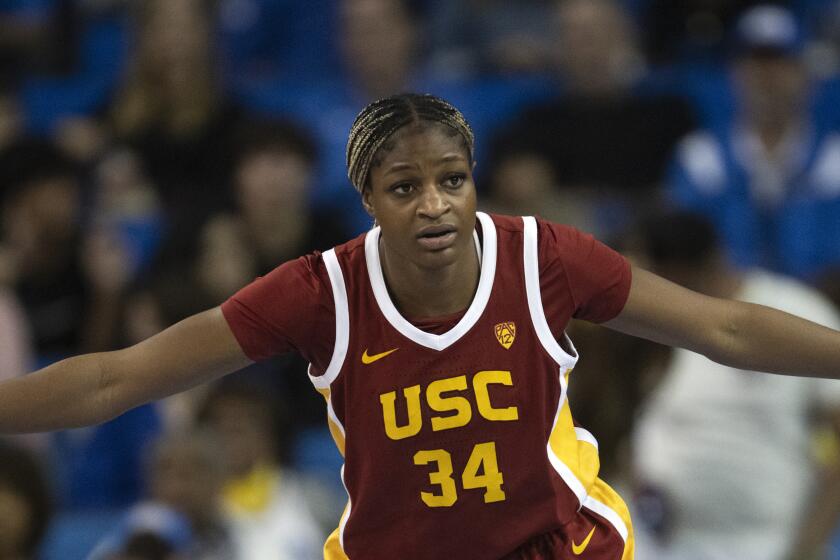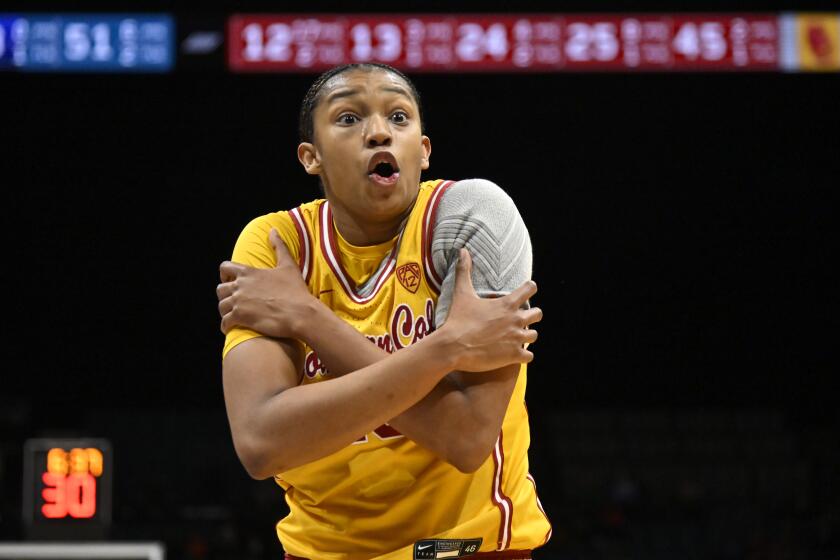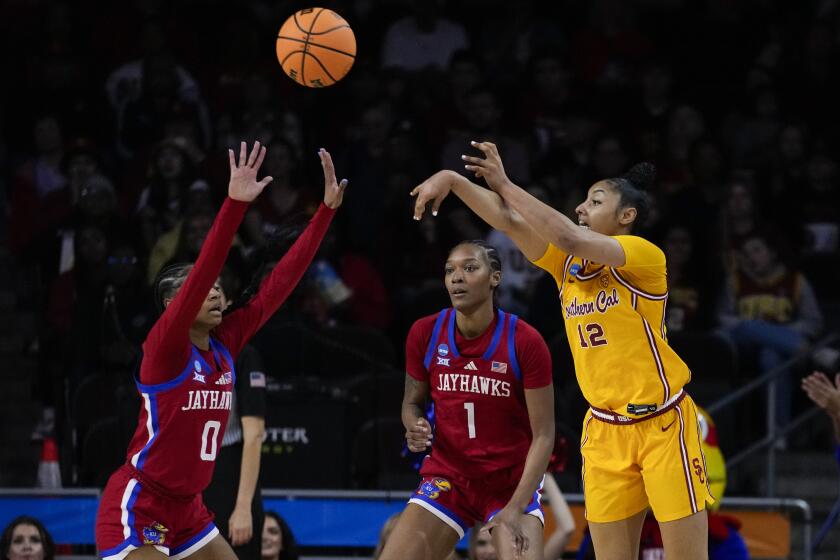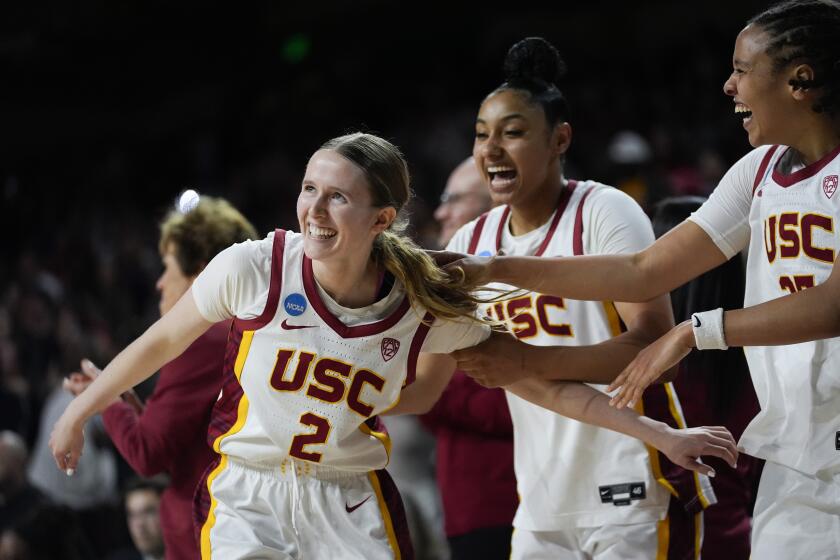USC’s Sweet 16 game changer: Meet the coach training the Trojans to go the distance
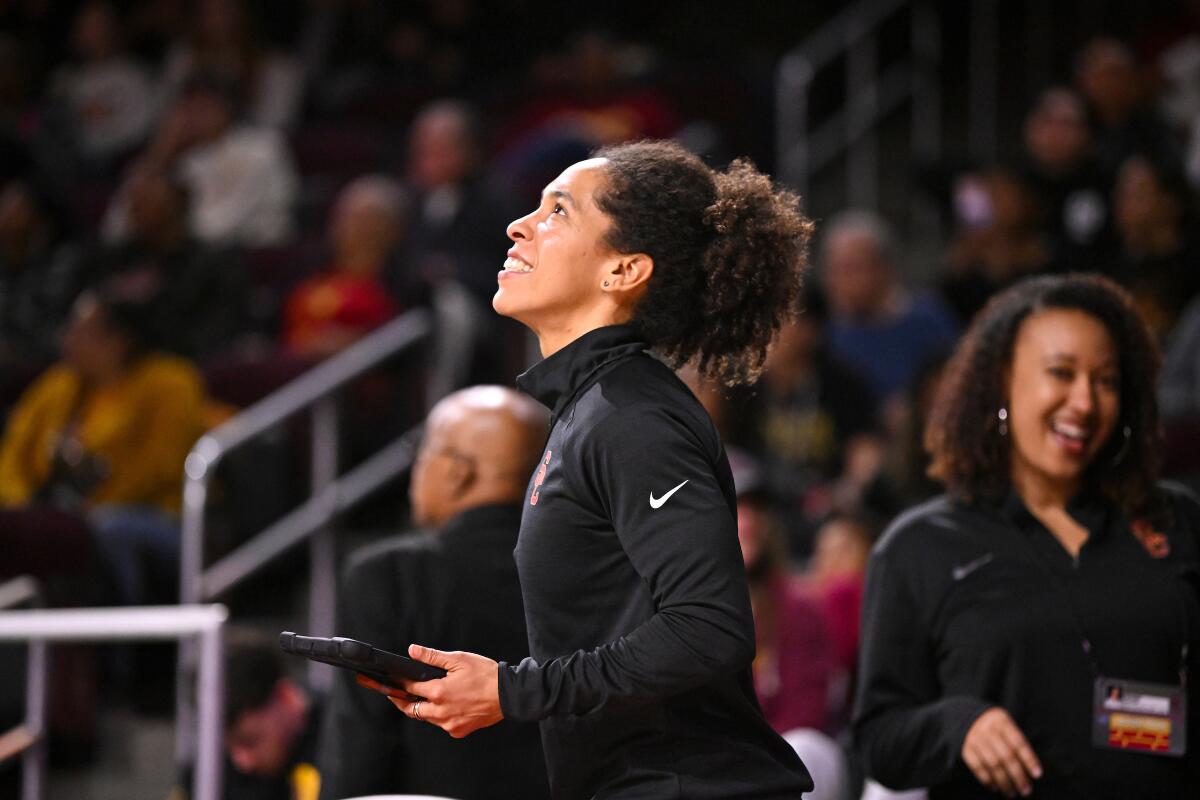
- Share via
The best recruit in the country has lived up to every ounce of hype. The Ivy League transfers have made the transition look seamless. But even as a new-look roster led USC to its first Sweet 16 since 1994, head coach Lindsay Gottlieb’s most critical offseason acquisition might be the coach leaning over a black clipboard at the end of the bench.
Kelly Dormandy is the muscle behind USC‘s resurgence.
The first-year director of sports performance is a culture-setting strength coach, mad sports scientist and vocal advocate for her athletes. On-court coaches have NCAA-mandated limits on how many hours they can spend with athletes during the offseason, which often makes strength coaches the staff member whom players are around most frequently. They are almost as responsible for setting a program’s foundation as the head coach.
In Dormandy, the Trojans have “the best in the business,” Gottlieb said.
After a win over Kansas to reach the Sweet 16, USC star JuJu Watkins says 6-foot-6 teammate Clarice Akunwafo can play ‘against any big in the country.’
“It’s really been game-changing for us.”
No. 1 seed USC faces No. 5 Baylor in the Portland (Ore.) 3 regional semifinal on Saturday at 2:30 p.m. (ESPN) at the Moda Center.
This stage has been on Dormandy’s mind since her first meeting with players in June when she went straight from the airport to campus on a Friday afternoon so she could meet the team before its first 7 a.m. workout Monday.
She introduced her coaching philosophy of S.W.O.L.E., an acronym that stands for standards, work, ownership, love and enforce accountability. After players introduced themselves and asked questions, Dormandy finished by explaining why she left her job working with Georgia women’s soccer to return to USC. She had previously rotated between beach volleyball, tennis, swimming and diving and soccer during a six-year stint with the Trojans. All were regulars in the national top-10 rankings. She won an NCAA title with USC’s women’s soccer team and two with beach volleyball. The only sport she worked with that didn’t come close to the sustaining standard, she told them, was women’s basketball.
“I made it very clear,” Dormandy said, “that the expectation was to be winners.”
She had already played more than a full 40-minute game’s worth of time. But late in double overtime against Arizona, with almost 47 minutes under her belt and a season-high 26 points, Rayah Marshall was still pressing on defense. The burning in her lungs and the lactic acid building in her legs couldn’t stop her after what she already conquered with Dormandy.
“You think you can’t go anymore,” Marshall said, “just remember Santa Monica stairs.”
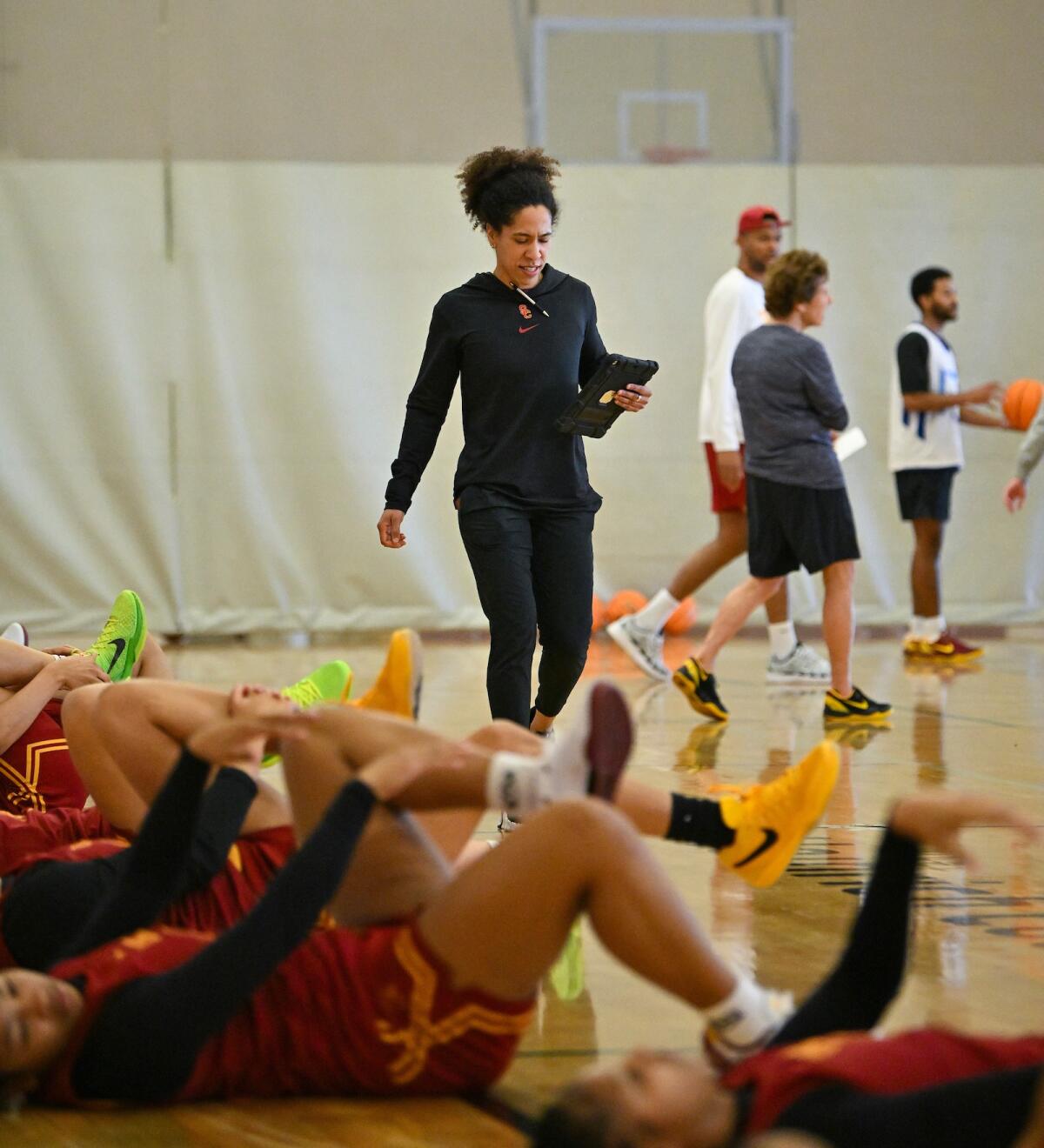
Dormandy promised her team during its first meeting that fatigue would not be a factor this season. Some of the Trojans are in the best physical and mental shape of their careers.
USC’s elite fitness and focus shows the most late in games. After five of their seven Pac-12 losses last season came by six points or fewer, the Trojans are now one of the best clutch teams in the country. Their 11 single-digit wins are the most for any team in the Pac-12, the conference that advanced five teams into the Sweet 16.
“We feel like in moments of exhaustion, we have more in the tank than other people,” Gottlieb said.
During the summer, players sprinted up the Santa Monica stairs and were sore for days. Guards McKenzie Forbes and Kayla Padilla, who room together, were holding onto the walls while hobbling around their apartment. After running their first batch of 22s — a conditioning exercise requiring athletes to run the length of the court and back, down again and then back through the free-throw line in 22 seconds or less — players are gasping for breath.
“It was the will to win. They weren’t going to be deterred. They wanted to show the country and those individuals of the past and the Trojan tradition that we’re back.”
— Kelly Dormandy, on USC’s NCAA tournament run
They managed six on the first day. Dormandy told them the goal was 20.
“She has to be ... lying,” Forbes thought to herself in the moment.
Standing in Galen Center sipping a smoothie after practice, five days removed from helping USC to the Pac-12 championship, the Harvard transfer chuckled at the memory.
“She wasn’t lying.”
Players reached the 20-repetition benchmark by the end of September. It took several more months for Dormandy to tell her strategy was working.
USC’s ability to play with joy amid mounting postseason pressure has led to the most successful stretch in decades with Baylor next in Sweet 16 matchup.
The way USC responded to a disappointing 62-59 loss at home to Washington proved it. USC bounced back from the loss with its first road sweep of Stanford and California since 2001. It sparked a seven-game winning streak. The Trojans have won 14 of their last 15 games.
“It was the will to win,” Dormandy said. “They weren’t going to be deterred. They wanted to show the country and those individuals of the past and the Trojan tradition that we’re back.”
USC is not just back on the national stage. The Trojans are better.
Gottlieb did not leave her job as an assistant with the Cleveland Cavaliers in 2021 without assurance that USC was serious about investing in women’s basketball. Along with Dormandy working as a dedicated strength coach for the team, USC is also traveling with a nutritionist for every game for the first time in Gottlieb’s tenure. They fly on chartered flights, even for regular-season games. USC’s best season in decades didn’t happen by accident, but instead by intentional investment and dedication from all levels of the athletic department.
“That’s not just blank checks,” Gottlieb said. “It’s administrative support understanding this is important.”
Creating an exclusive strength and conditioning position for the women’s basketball program was a top priority for Gottlieb when she signed on in 2021. Last season, the Trojans worked with Nik Popovic as the program’s first exclusive performance coach, but the veteran strength coach returned to his native Australia this year.
JuJu Watkins finishes with 28 points as the top-seeded USC women defeat Kansas to reach the Sweet 16 of the NCAA tournament for the first time since 1994.
When she saw a post on social media about the open position, Dormandy didn’t realize it was specifically geared toward women’s basketball. She knew she was interested in returning to L.A. after making the city her second home for 10 years while working with USC, the L.A. Sparks and Loyola Marymount. The opportunity only grew larger when she spoke with Gottlieb about her vision.
“From the outside looking in, I could see there was a far more serious investment in women’s basketball with the hire of Coach Gottlieb,” Dormandy said, “then obviously with the incoming class with JuJu [Watkins] as the No. 1 recruit in the country, I knew she was looking to build something really special.”
Watkins heard the stories and saw the Instagram posts of bulging arm muscles and defined abs. When it came to the team’s new strength coach, the star freshman was “intimidated as hell.”
But Dormandy quickly showed players she’ll do more for them than just build muscle.
Dormandy monitors the GPS devices players wear measuring their heart rate and movement. On Tuesdays, she tests each player’s vertical jump, using the amount of force they put into the ground as a measuring stick for how fatigued they are after the weekend’s games. She monitors their hydration levels and sleep. Combining all the data, Dormandy works with coaches to plan practices that allow players to be at their physical peaks for games.
“She’s smart,” Watkins said. “She knows at this time of the season, we’re not going extra. … At the end of the day, it’s whoever lasts the longest.”
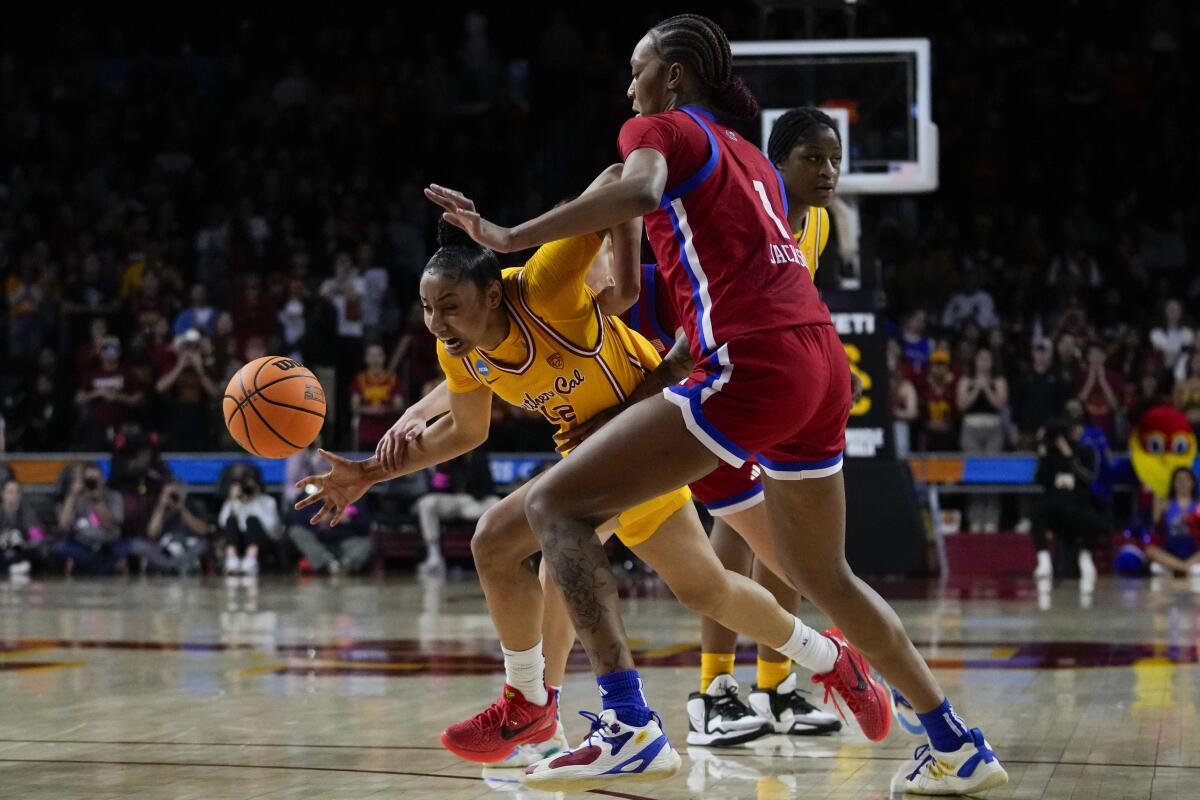
Dormandy keeps especially close track of Watkins. USC’s first All-American since Tina Thompson in 1997 has the highest usage rate in the country. She has sat out stretches of key games because of cramps. She needed an IV to take in extra fluids at halftime against Utah.
Facing the postseason stage, Dormandy met with Watkins and showed her a chart showing Watkins’ hydration levels for each game and key performance metrics. Her best games on the court — 51 points against Stanford, 42 against Colorado — were also her most hydrated. Using Dormandy’s findings as motivation, Watkins is now drinking water with electrolytes religiously during every film session.
“High school, eat whatever, drink whatever and play, have fun,” Watkins said. “Now it’s more like, season’s way longer so it’s really just making sure I’m prepared mentally, physically and emotionally.”
Gone are the days of just waiting to see players at practice, Gottlieb said. She wanted to surround her athletes with a pro-model, all-encompassing support staff to succeed.
USC walk-on India Otto, a favorite among USC fans and players, put a joyful exclamation point on USC’s NCAA tournament win over Texas A&M Corpus Christi.
Early in her career, success, to Dormandy, meant championships. The former collegiate soccer player whose playing career ended because of a neck injury chased the titles for herself. Then she “got out of [her] own way.”
“I realized it wasn’t about setting myself up to be successful, but setting these kids up to realize their dreams,” Dormandy said. “There’s no better feeling than watching the joy on their faces when the confetti is falling and they get to hoist the trophy to realize that hard work does work.”
In a red-and-yellow confetti storm, Dormandy beamed on stage in Las Vegas when Watkins lifted USC’s first Pac-12 trophy in a decade. It was surreal, she said a few days later while sitting on an exercise ball in her office. But it wasn’t the end.
“My eyes are on a bigger prize,” Dormandy said, “and I think theirs are too.”
More to Read
Go beyond the scoreboard
Get the latest on L.A.'s teams in the daily Sports Report newsletter.
You may occasionally receive promotional content from the Los Angeles Times.

